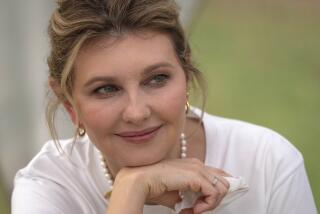Lessons of War : Youths Who Have Seen Battle Share Their Experiences in a Series of Talks
- Share via
Jose Chavarria’s introduction to war came early.
“When I was 11 I (was forced to) join the army,” he said. “They dragged me from my home. I was playing in the back yard with a couple of my friends and. . . .”
Jose stood gripping the microphone, unable to continue the story of how he was kidnaped, taken to the jungles of El Salvador and taught “how to hate people.”
The audience, a group of students at University High School in West Los Angeles, sat in silence as the 17-year-old stared at the ground, seemingly searching for words to continue.
Sitting nearby, lending their support, was a group of young people who have experienced similar pains. Paula Nahhal, 15, spent six months in a bomb shelter in Lebanon last year, hiding from the bombing and shelling. Donovan McCoy, 17, a former member of a New York “posse,” had to fight his way out of urban gang life. And Sherry Sami, an 18-year-old Iranian, fled turmoil in her country after relatives were killed.
These are the Children of War.
For the last three weeks members of the New York-based group have spoken at area schools and to community groups on their experiences.
A Cambodian refugee who came to this country after his parents had been killed by the Khmer Rouge started the Children of War in 1984 to help other young victims of war living in the United States.
While the youth speak of war, they bring a message of peace.
“We are here to tell you that people are dying, that people are suffering,” Nahhal said. “It’s time to stand together and make peace.”
She said she has never “known the good things” Lebanon has to offer.
“When we go outside, we don’t know if we will come back,” she said. “When we go to sleep, we don’t know if we’ll wake up.”
She recalled how her best friend was killed during an attack at school. “The shattered window went through (her) body and she died,” Nahhal said.
Others who died “were playing in the courtyard when the bombing started.”
“Damn,” one student in the audience muttered softly.
Hearing the chilling accounts was emotional and educational for many students attending the presentation.
Marscina Kilgore, 16, sat listening intently with a furrowed brow.
“I don’t watch the news, and I seldom read the paper,” she said afterward. “I didn’t know (war) involved people our age.”
Others felt almost ashamed of their own lifestyles after listening to the speakers.
“I felt really spoiled sitting here,” said Jennifer Naman, 17. “They’re standing there saying they don’t have any freedom, no family to speak of. I felt so bad.”
Roger Rosen, the group’s adviser, said the presentations are often cathartic for the young speakers--part of their healing. The youths--some of whom plan to return to their native countries--spent a week listening to each other’s stories before beginning their speaking appearances.
While they have learned to lend each other support during the emotion-filled presentations, stepping in front of a microphone has not always been easy.
“It’s hard for me to (speak) because I have seen my family die in front of my eyes,” said Chavarria, from El Salvador. “I don’t want to remember.”
One woman from South Africa appeared on the program but asked to remain anonymous for fear of reprisals against her family.
Living under apartheid is as devastating as any war, she said. “It teaches you hatred,” she said. “It makes you very bitter. It’s not easy to trust the next person. It has also made me be brave . . . not to fear anything.”
Response to the group’s appearances has been generally favorable. But Jerry Shapiro, associate director of the Anti-Defamation League regional office, said speeches by an Israeli teen-ager and a Palestinian youth painted an unfair and simplistic picture of a complex situation.
“We’ve received scores of complaints because the program was found to be skewed, biased and manipulative,” Shapiro said, adding that the presentations seem “to be very carefully scripted.”
However, Lora Sandroni, a Children of War volunteer, said the “individual kids bring their personal opinions and experiences to the group. They are not in any way primed. They share what’s in their hearts.”
More to Read
Sign up for Essential California
The most important California stories and recommendations in your inbox every morning.
You may occasionally receive promotional content from the Los Angeles Times.










